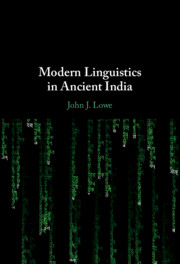Book contents
- Frontmatter
- Contents
- Acknowledgements
- Glossary
- List of Abbreviations
- Texts and Authors
- The Sanskrit Transcription System
- 1 Introduction
- 2 The Aṣṭādhyāyī at Work
- 3 Rule Interaction
- 4 Morphological Systems
- 5 Syntax: Argument Structure
- 6 Formal Language Theory and Computational Power
- 7 Semantics and Pragmatics: Compositionality and the Relation between Grammar and Meaning
- 8 Phonology: Phonemes and Writing Systems
- 9 Conclusion
- References
- Subject Index
- Author Index
- Index Locorum
- Word Index
7 - Semantics and Pragmatics: Compositionality and the Relation between Grammar and Meaning
Published online by Cambridge University Press: 14 March 2024
- Frontmatter
- Contents
- Acknowledgements
- Glossary
- List of Abbreviations
- Texts and Authors
- The Sanskrit Transcription System
- 1 Introduction
- 2 The Aṣṭādhyāyī at Work
- 3 Rule Interaction
- 4 Morphological Systems
- 5 Syntax: Argument Structure
- 6 Formal Language Theory and Computational Power
- 7 Semantics and Pragmatics: Compositionality and the Relation between Grammar and Meaning
- 8 Phonology: Phonemes and Writing Systems
- 9 Conclusion
- References
- Subject Index
- Author Index
- Index Locorum
- Word Index
Summary
In this chapter the focus moves beyond Pāṇini’s grammar to address a topic of major concern within the broader Indian tradition: semantics. While some observations regarding semantics can be drawn from Pāṇini, for the most part semantics was treated as a separate field of inquiry within the Indian tradition until the early modern period. This chapter provides introductions to the traditions of semantic analysis in ancient India and the modern West, and a comparison of their approaches to one issue of central concern in semantic theory: compositionality.
Information
- Type
- Chapter
- Information
- Modern Linguistics in Ancient India , pp. 165 - 187Publisher: Cambridge University PressPrint publication year: 2024
